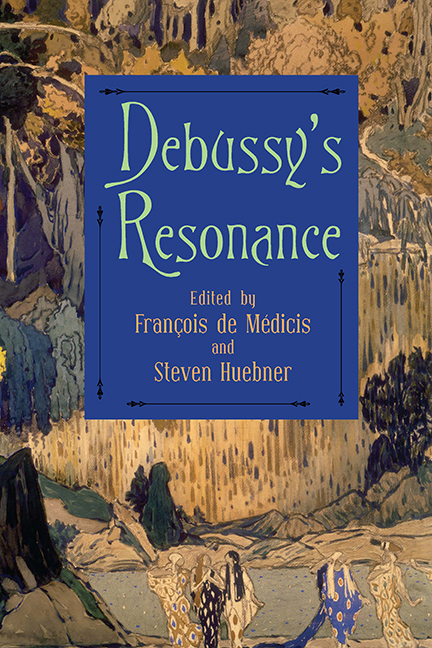Book contents
Introduction
Published online by Cambridge University Press: 27 July 2019
Summary
As the figure of Claude Debussy (1862–1918) relentlessly recedes into the past and we arrive at the centennial of his death, an ever abundant harvest of documents surrounding his life and work continues to bear fruit: the moment seems ripe, almost ideal, to dedicate a new research volume to him. Beyond the occasion of the anniversary, the composer maintains a preeminent status in accounts of musical modernity at the fin de siècle and early twentieth century— and without his music having lost any of its freshness.
Debussy is still a major presence in the performing canon. Among the pioneers of modernism, his music has always attracted the largest number of listeners. But what about the current state of research? In his valuable Claude Debussy: A Guide to Research, published in 1990, James Briscoe was able to identify and describe 910 secondary sources. Work on the critical edition had just begun a few years before and publication of the complete letters, the Correspondance (1872–1918) by François Lesure and Denis Herlin, was still many years off. There had nonetheless been considerable research activity since 1945: in his contribution to our essay collection relating to the historiography of Debussy research Richard Langham Smith offers much insight into Debussy scholarship in the post-World War II era, including (on the Anglo-American side of things) the key role played by Edward Lockspeiser. Now a perusal of RILM under the subject heading “Debussy” from the year of Briscoe's volume to the present shows no fewer than 2,271 entries, a staggering increase of activity that shows no signs of abating. This is more than double the number produced in the entire century before, and it makes for a persuasive statistic to encourage the production of a second edition of Briscoe's volume. Readers with a penchant for figures will savor the RILM yield in the period 1990–2015 for other composers: Beethoven (6,675), Wagner (7,870), Schoenberg (4,171), Stravinsky (2,629), Bartók (2,215). With all the activity related to Debussy, Richard Langham Smith asks in the title of his essay for the present volume “Has the barrel run dry?” We might also reflect upon how the current state of Debussy's research should be judged. Are we still puzzling, searching, and trying to make sense of a music that remains out of reach, out of firm grasp?
- Type
- Chapter
- Information
- Debussy's Resonance , pp. 1 - 16Publisher: Boydell & BrewerPrint publication year: 2018



